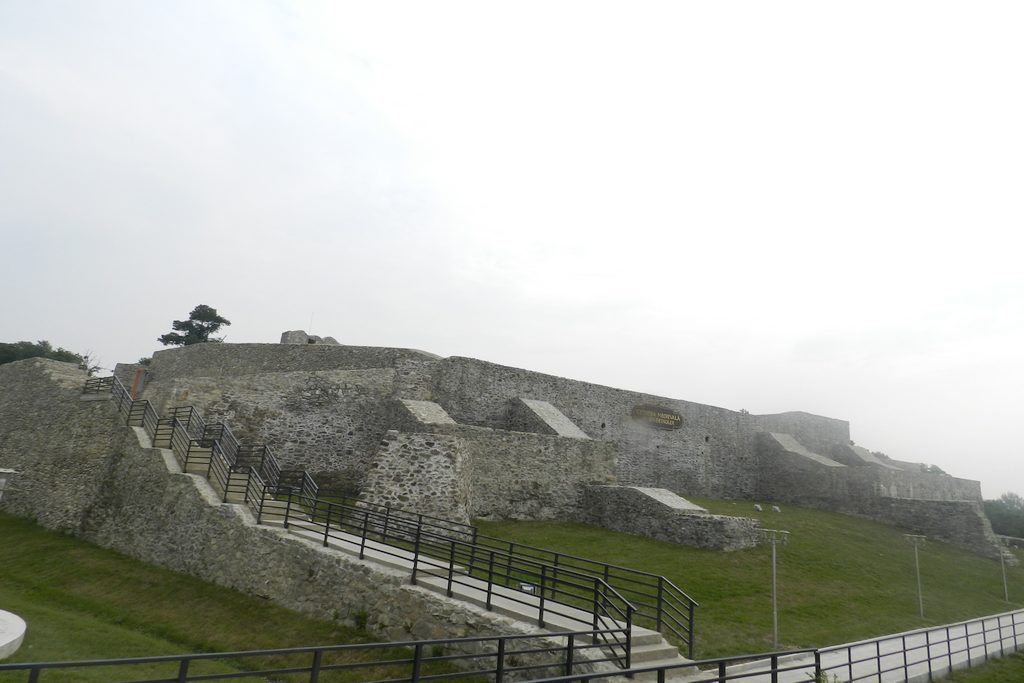

The medieval name of the Severin fortress could have three possible origins: a latin one, associated to emperor Septimiu Severus’ name; a slavic one, associated to the word “severnâi”, translated as „northern” or „from the north”; a religious one, associated to Saint Severin de Noricum, protective saint in the Middle ages of the latin church inside the medieval fortress when it was being used by Catholic misionary monks from the northern part of Austria (Noricum).
The ruins we see today are not from a single construction. There were two compounds, interior and exterior, the latter surrounded by a ditch. The diggings revealed a series of square towers flanking the interior yard; two are placed on the side flanking the interior compound, two placed on the southern side in the extremes and another two on the interior side of the defence wall. Of the north east side tower there is still one wall, reaching up to three floors 11m high, 9m in lenght and 2.5 m in width.
Luca the first ban of Severin, was mentioned in 1233. The year 1233 can be seen as a new founding date on top of the Drobeta ruins, with the name Severin (Severinopolis) (major fortress of Banatului de Severin, Terra Zeurino, Tara Severinului). The Severin name was taken in memory of emperor Septimiu Sever, who had raised Drobeta to the rank of colony. In this same period the Grădetului fortress was probably built.
In 1247 the Hungarian kingdome brought the Knights of Malta to the country, settling them in Severin, where they will build the Severin Medieval Fortress (Zeurini camp mentioned in the Knights of Malta diploma of 1247), strong fortress inside which there was also a gothic church built, probably the residence of the Catholic Severin bishopric, which was here until 1502. The knights will retreat in 1259, the fortress remaining in the Turkish Bulgarian and Tatar cannons way, who wanted to cross the Danube and of the Hungarian attacking Oltenia, At the end of the 13th century king Stefan of Hungary lead 5 wars with the Bulgarian czardom to defend the Severin Fortress.
The Romanian voivodes have also disputed their priority over the famous fortress conquering and claming it many times. For it Litovoi died, Basarab I humiliated Carol Robert de Anjou at Posada in 1330. Mircea cel Bătrân founded the Bania Severinului and in 1406 he signed an alliance treaty with Sigismund of Hungary in Severin. After Mircea’s death. Sigismund will free the Severin Fortress from the Turkish people and will grant some favors for the Vodița and Tismana monastaries. Then Banatul de Severin accrues to Iancu de Hunedoara, who fortifies all the Danube fortresses.
After the Constantinopole fall in 1453, the attacks in the Danube fortress grew worse. In 1524, after a devastating attack of the Turkish people lead by Soliman Magnificul, from the Severin fortress there was only one tower left, which lead to naming the place by the people of Mehedinti “Turnul lui Sever” (Tower of Sever). For almost 300 years the fortress was rebuilt after each battle carried here to defend Wallachia, against the Hungarian and Turkish people. The former Drobeta was reborn. In this period of 3 centuries coexisted two christian churches, a Catholic and an Orthodox one.
